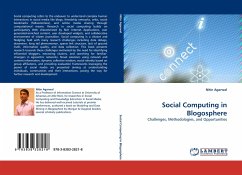As social media more and more connect the entire world, there is an increasing importance to analyze multilingual data rather than unilingual data. The automated sentiment analysis we perform extracts opinions from the relatively short messages placed on social media in multiple languages. --- We present a four-step approach to perform sentiment analysis. Our approach comprises language identification, part-of-speech tagging, subjectivity detection and polarity detection. For language identification we propose an algorithm we call LIGA which captures grammar of languages in addition to occurrences of characteristics. For part-of-speech tagging we use an existing solution called the TreeTagger, developed at the University of Stuttgart. We apply AdaBoost using decision stumps to solve subjectivity detection. For polarity detection we propose an algorithm we call RBEM which uses heuristic rules to create an emissive model on patterns.
Bitte wählen Sie Ihr Anliegen aus.
Rechnungen
Retourenschein anfordern
Bestellstatus
Storno








